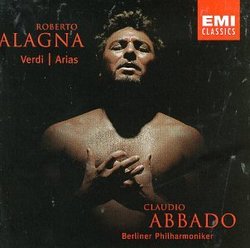| All Artists: Berliner Philharmoniker, Claudio Abbado, Roberto Alagna, Angela Gheorghiu Title: Roberto Alagna - Verdi Arias / Gheorghiu, Berlin Phil., Abbado Members Wishing: 0 Total Copies: 0 Label: Angel Records Release Date: 3/17/1998 Genre: Classical Style: Opera & Classical Vocal Number of Discs: 1 SwapaCD Credits: 1 UPCs: 724355656728, 724355656759 |
Search - Berliner Philharmoniker, Claudio Abbado, Roberto Alagna :: Roberto Alagna - Verdi Arias / Gheorghiu, Berlin Phil., Abbado
 | Berliner Philharmoniker, Claudio Abbado, Roberto Alagna Roberto Alagna - Verdi Arias / Gheorghiu, Berlin Phil., Abbado Genre: Classical
|
Larger Image |
CD Details |
CD ReviewsAlagna's best album 08/18/1999 (4 out of 5 stars) "If you are a fan of tenor voice like me, then you most likely are following the news and trying to keep up with emergence of myriad of tenors for whom the success of the Big Three paved the path to stardom. While most of them are one-day sensations, Roberto Alagna and Jose Cura are definite successors to the seasoned veterans. While Cura has made his impressive claim with Puccini, Alagna brings his considerable talents to very difficult Verdian repertoire. Blessed with sweet lyric relatively high tenor voice (a polar opposite to Cura's and quite similar to young Pavarotti's) and astonishing breath control, he is very comfortable on early Verdi selections (I Lombardi, Luisa Miller), and can handle arias from Otello and La Forza del Destino, even though he hits his limits in low range there. The critics don't really have a convergence of opinions when it comes to Alagna. However, this album was generally welcomed. It's a thoroughly thought out voyage into the world of Verdi, encompassing various periods of the composer's life, and it features the amazing Berliner Philharmoniker with its greatest opera conductor since Karajan - maestro Claudio Abbado. An orchestral interlude from la Forza and a brief appearance of Angela Gheorghiu in Di quella pira are two pleasant additions. Some reservations: not including "Parmi veder le lagrime" which seems tailored for Alagna's voice, and instead supplying first "La mia letizia infondere" (track 3) and later "Je veux encor entendre" (track 20), two essentially the same arias. Also Alagna does not sing the high C at the end of "O, tu che l'alma adora" from Ernani , even though he's perfectly capable of doing so, and virtually every other tenor does it even on stage. Still, the album is interesting, enjoyable, and probably the best one out of all Alagna's discography as of now." He may be opera's Bad Boy, but the voice is so good. Rick Holden (sceptic.one@mindspring | Huntsville, AL | 09/27/1999 (5 out of 5 stars) "Here we go again! Before the week is out, some wag will comment viciously on Alagna's display of hairy chest on his new CD cover. (Well, some Verdi arias are rather hairy-chested, aren't they?) What was the last complaint? Oh, yes, there were too many cutesy photos of he and his wife in the last CD "paperwork." Okay, it's out of the way--shall we discuss music, now? Sorry to keep repeating myself, but this is a superb recording. Obviously more disciplined in the studio than on stage, the voice is just incredibly lush, strong, and beautiful. If he keeps it up, he will become another Bergonzi, and that is the highest praise I can give any singer. I like the fact that he doesn't take the easy way out on this CD-there are lots of vocal challenges. Expecting to hear a rather limp Otello, I was surprised by the maturity of the interpretation; he's not ready to do it on stage (if he's smart), but he provided a real fortaste of what that event will be like. Alagna is the most "tenor-ly" of all the newer tenors today: he does not sing toward the tenor-baritone "line," nor is he overly lyrical. Seemingly a true "spinto," he is rapidly becoming the Pavarotti for the next century (which, incidentally, folks, begins Jan 1st, 2001). He and the other great new singers--Bocelli, Cura, Heppner, et al--will no doubt provide us with many years of beauty and excitement in the years ahead." SUPERBLY PHRASED VERDI Music lover | Philadelphia | 11/10/2003 (5 out of 5 stars) "I am surprised to find myself giving this record a complete thumbs up. Alagna's voice sounds comfortable in all of the selections, and they range from the lyrical to the outpourings of Otello. But what impressed me most was his musicality, his phrasing in thses demanding pieces. There are hundreds of "Celeste Aida" out there, bringing something new to such a warhorse would seem impossible, but it is done here. The key to much of Verdi's music is the 'arch', Verdi is famous for his arching melodies. Alagna uniquely understands this and phrases the very difficult 'ergerti un trono vicino al sol' in a beautiful arch, with a nice corona on the B flat, he then shows off his breath control by aliding right into the succeeding upward sweep of 'celeste Aida'. Fabulous! And I have never heard it this way before. Every other tenor in my experience goes up to the B flat and holds it for dear life and then swiftly descends on the phrase, never making it one continuous phrase and thus altering the inherent shape of the piece.The "Ballo" aria is full of detailed expressive touches as Alagna follows Verdi's markings. He is the only tenor I have heard to actually sing with the 'voce cupa' Verdi demands at 'ed or, qual reo pressagio'. Examples like this arethroughout the recital. This is a musician of the first rank with an attractive voice and personality. Bravo Signor Alagna."
|

 Track Listings (22) - Disc #1
Track Listings (22) - Disc #1